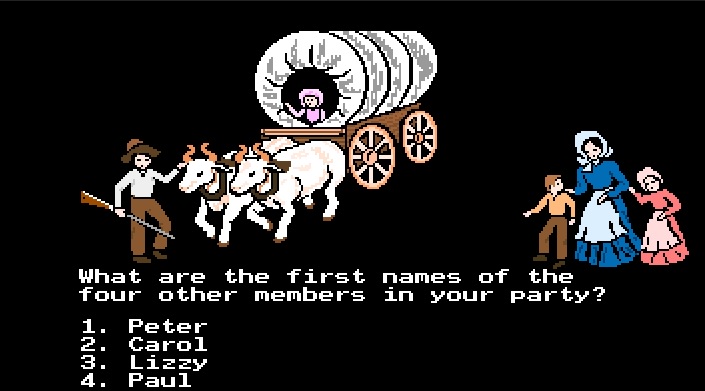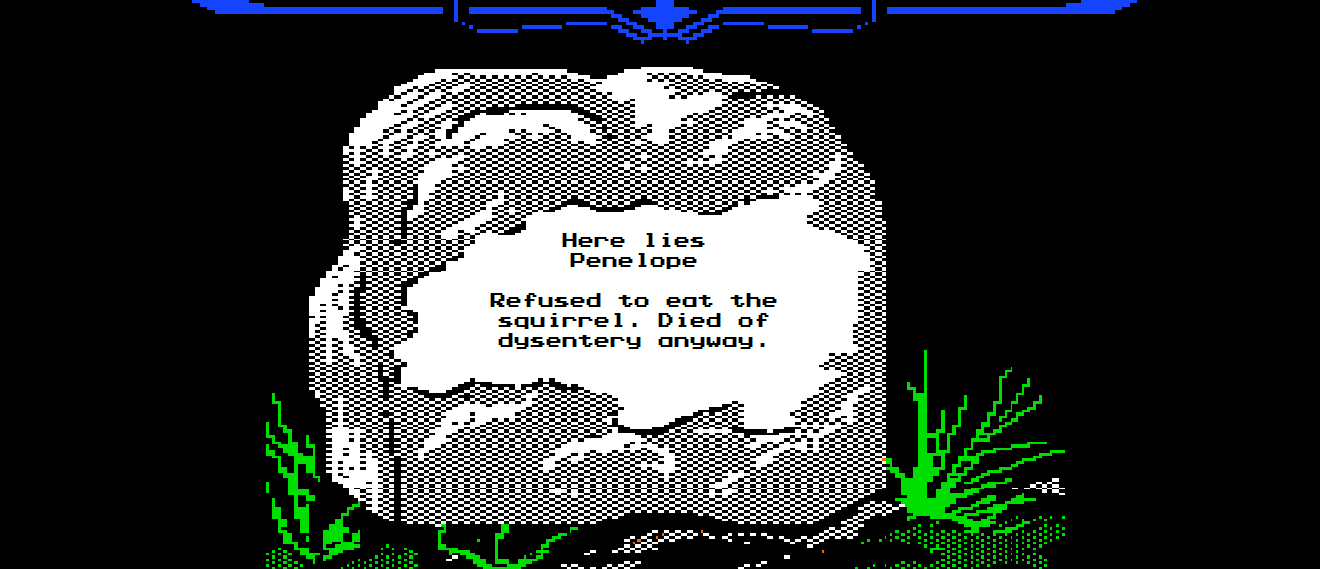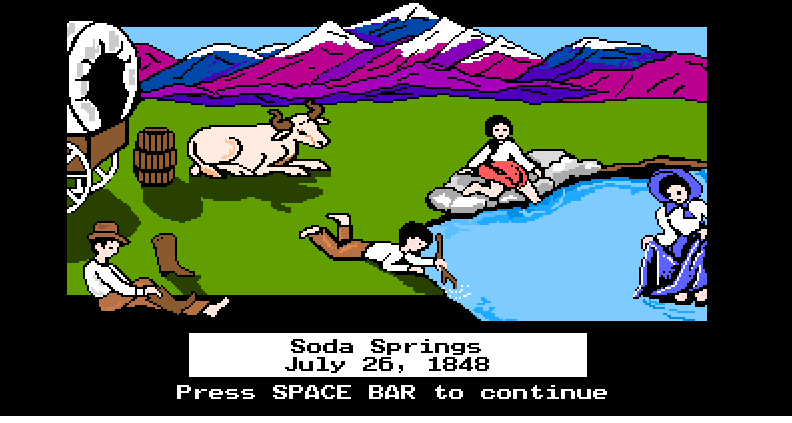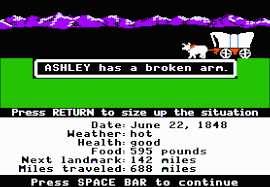There is much to be excited about on the program of this year's
Fringe Festival. The official tagline, after all, is "Welcome to the Weird and Wonderful." I've been drooling over the offerings for weeks, but I must confess that one particular show stood out to me from the moment I heard about it. It's called
Ruts! The Oregon Trail Experience, and it's happening at the
Altamont Theatre on Thursday, 1/21, and Saturday, 1/23. If you, like me, came of age in the 90's, you already know exactly why I'm excited. If you didn't, and you have no idea what I'm talking about, read on!
Ruts! is written and directed by
Deborah Harbin, with music composed by
Paul Obarowski. Described as a techno-midi mashup musical, it takes as its subject the Oregon Trail, the 2,170 mile route through the wilderness between Missouri and the West coast that the first settlers who moved West followed during the nineteenth century. But that's not all. As we lucky late 20's/early 30's-somethings know, the historical trail was also the inspiration for an early iOs game that has become inextricably connected with our
childhoods.

In the early days of personal computing, when the first computer labs sprang up across the country in public schools, I and my fellow students were introduced to something wondrous. Ushered into our computer lab, where we sat in front of large
Apple IIe computers that somehow, miraculously, already looked ancient, we played games. One of these games, children, was
The Oregon Trail. A merciless adventure game that led you on the trail with your virtual family, it forced you to (kind of) face the problems of early settlers, from fording rivers to dysentery. Typically, death was
swift. You and your whole family would be lost while wading through flooded waters, or you'd get some horrible disease that would sweep through and, you guessed it, kill everyone. Upon the event of your death, you'd get a sweet personalized tombstone.
 You, too, can now generate your own personalized
You, too, can now generate your own personalized Oregon Trail
tombstone.
I don't know if anyone ever made it to California. I know I never did.
Time called it "the game that traumatized countless children of the 80's and 90's" as they felt "the oppressive horror of attempting to fight their way across the Oregon Trail on a steady diet of squirrel meat."
Yeah, it was traumatic. But it was also a hell of a lot of fun. And that's why Debbie and Paul teamed up to bring it back, with a few
twists. I talked with them about their inspiration, their own experiences of the game, and what we can expect from the performance (happening twice throughout the weekend, lucky for us!). Even if you're not familiar with the game, this performance is going to be a highlight of the weekend.
Ali: Can you give me a brief synopsis of the piece? What can people expect? Is this the debut performance?
DEBBIE: Here’s the official synopsis.
Ruts! The Oregon Trail Experience, a techno-midi mashup musical, transports western pioneers from the Oregon Trail of the 1840s inside the fantastical video game of the same name. Trapped inside the program, they are forced to continue West against insurmountable odds or suffer and die on the trail. Will this pioneering family push through to find prosperity in Oregon, or will they press the escape key to exit the game?
It’s possible that synopsis raises more
questions than it answers, but one thing I enjoy about the play is that the main characters, like the audience, start the play a little confused. They’re figuring out their environment the way a player would explore a new video game. That confusion is more than OK with me, and I hope the audience is able to ride it. When they do, they can expect an anti-realistic, music-and-sound driven, frenetic comedy with a moderate dose of audience abuse.
Ali: Tell me about how you thought up this project. I assume you had your own early experiences with the game. How did these evolve into the creation of the piece?
DEBBIE: The path to this piece was quite indirect. I did certainly have early experiences with the game. My father worked as a school principal, and when my siblings and I were young, he’d take us into work with him in the summer and set us loose in the computer lab. That said, this project germinated as a tribute to some beloved family friends, with whom we toured the Midwest many years ago. I have this very vivid memory of a mother-led march in a killing heat out to see the
Oregon Trail ruts. In the end, we kids were just too sweaty and whiny and sad to understand the significance of these dumb old grooves in the ground. That memory got me thinking about the contrast between the patient longsuffering of our pioneering ancestors and the way I as a 21st-century, privileged, western person experience suffering – mostly mediated, highly temporary, and too often at the hands of malfunctioning technology. This brought me around to
Oregon Trail the video game, and to the absurdity of creating entertainment out of the suffering of our ancestors. Of course, that’s what dramatists do all the time – make entertainment out of other people’s suffering – so it’s much less a critique than an exploration.
Ali: Related to the last question: this game has such a hold on the imaginations of so many people, particularly in their later 20s and 30s. Why do you think this is?
DEBBIE: It’s an interesting question, because it pre-dates the NES, and yet I think most people were introduced to both at around the same time. For me, as much as Super Mario Bros., et al., have a nostalgic hold, there’s something in
Oregon Trail that’s more meaningful. Your party is supposed to be your family, and they die of specific diseases. There’s not really much fun to the game beyond trying to keep your family out of the jaws of death (and then creating a personalized tombstone when you
inevitably fail). Maybe it’s that slog itself, and the urgency of the game’s task, that has it burned so deeply on our brains.
PAUL: I remember playing
The Oregon Trail in our school’s computer lab, alongside my classmates. I suppose they justified letting us play a video game on school time because it was also intended to be an engaging history lesson, but the dual-purposed nature of
The Oregon Trail made it the only video game I remember being (proscribed) on school time. That’s reason alone to venerate
The Oregon Trail.
Moreover, we experienced so many of our current retro cultural icons either in solitude or in small groups, like books, console games, or watching movies. I can’t really think of a better example of a piece of media that was so thoroughly shared as a
communal experience with my peers. I’d suppose that’s why
The Oregon Trail has morphed into such a universally accessible
symbol of growing up in the 90s, while figuring out technology (and also being completely enthralled by it). Plus, it’s a constant reminder to be vigilant against
cholera. We’ve got our eyes on you, cholera.
 Ali: This also seems to be so much about looking back on past technologies (material and metaphorical). There are so many layers in this piece--the imagined historical period of the 1840s and Westward Expansion, the imagining of that period in and through the game, our engagement with the game at the moment it was popular/available, looking back on it in this moment, the use of technology in the composition of the music, etc. The theme of nostalgia is obviously present but there's an edge to it, a bit of a wink. Can you speak a little about this theme?
DEBBIE:
Ali: This also seems to be so much about looking back on past technologies (material and metaphorical). There are so many layers in this piece--the imagined historical period of the 1840s and Westward Expansion, the imagining of that period in and through the game, our engagement with the game at the moment it was popular/available, looking back on it in this moment, the use of technology in the composition of the music, etc. The theme of nostalgia is obviously present but there's an edge to it, a bit of a wink. Can you speak a little about this theme?
DEBBIE: David Sedaris has a short essay called “Repeat After Me,” in which he recounts receiving a teary, dark, sad secret from his sister Lisa. As she finishes telling him the secret, she tries to exact a promise that he will not include her story in any upcoming books; he dodges her request, insisting that she’s never going to “do anything with” the story herself. Reflecting back on the incident, he expands: “Your life, your privacy, your bottomless sorrow. It’s not like you’re going to do anything with it.” For me, that’s where the edge comes from in
Ruts! All those layers – the time, the technology, the cheery nostalgia – stand between us and the bottomless sorrow of those who died on the trail. These multiple layers make it possible to create a comedy out of their suffering, and that is a really dark thought. It’s an aspiration of mine to write comedies that also stab the audience in the gut – and while I don’t think the knife is too sharp here in
Ruts!, I hope the audience will feel the tickle of that edge you’re describing.
Ali: Can you talk a bit about how the project evolved from conception to final stages? Any particular unexpected (or expected!) challenges or rewards?
DEBBIE: Well, it has certainly evolved! The first draft was a pretty messy collage of loose memoir, historical vignettes (real and imagined), the game, and two-star yelp reviews of West Coast natural wonders. Killing your darlings is always the hardest part of drafting, but it wasn’t until I started collaborating with Paul and receiving his feedback that I freed myself to cut almost everything but the Oregon Trail game stuff. From there, the script tightened up significantly, and the addition of the music has really transformed the play. As always, the script morphs again once its on its feet, and I’ve found that since the actors started working with it and giving me their commentary, the main characters have warmed and become more complete. I’m really pleased with how it’s progressed so far.
Ali: Debbie, it sounds like (based on the description) you researched the actual Oregon Trail and part of the fun of the piece is imagining *real* settlers shoved into the gamespace. Can you speak about this a little? Anything particularly interesting that you learned when looking into this period/these events?
DEBBIE: I did do some research on the real trail, though I must confess I have not burdened the main characters with fully-formed pioneer backstories. It’s almost as if they are characters created for the game, with complete personalities but only enough historical grounding to keep them believing they’re real people – like a sleeper Cylon or (insert your favorite relevant sci-fi reference here). However, the piece of research that most surprised and delighted me was a database of letters from the 1840s, in which settlers described the Willamette Valley to their families back home. Some pioneers were very happy, but others haaaaaaaaaaated Oregon. Hated it. Just wanted to be back home, but of course they couldn’t really turn around and go back to Illinois or Missouri or wherever they came from. I found the raw responses in those letters shocking and thrilling and a little heartbreaking.
 Ali: Paul, how did you compose the music? How did the collaboration/idea sharing work between you and Debbie?
PAUL:
Ali: Paul, how did you compose the music? How did the collaboration/idea sharing work between you and Debbie?
PAUL: Though RUTS opens with an “analog” acoustic duet, every piece after that features lo-fi MIDI. Luckily, when it came down to composing the music, it was clear what needed to happen from day one. Debbie did a great job of communicating the intended effect of the music in her earlier drafts. After a bit of tweaking synth parameters and dropping bitrates, I got a solid lo-fi 8-bit feel that I was really happy with. The collaboration work between Debbie and me went really smoothly, because she and I were on the same page about the music. She kind of just gave me some ideas about what she wanted, and let me go crazy. There’s a trusting nature there that’s very flattering.
DEBBIE: The flip side of that, of course, is that Paul really understood and was able to create what I was hoping for from the
soundscape of the play, specifically the persistent, unflagging, unbearable cheeriness I wanted the MIDI music to convey. That part of the play was certainly amplified through our collaboration.
Ali: I know from watching some of the YouTube videos you've posted that this isn't your first time collaborating (I really enjoyed "Bad Neighbors"!). Can you talk a little bit about how you started working together, how it's evolved, etc?
DEBBIE: Ha, “Bad Neighbors”! I’ll mostly leave this one to Paul, but the collaboration really did start when Paul invited me to sing (and ultimately act) on some of his artistic projects. That gave us some opportunities to figure out each other’s
working styles just a little bit. I find more dissonant collaborations incredibly stressful, so it was really useful to work on those smaller projects and figure out that neither of us was going to steamroll the other’s ideas.
PAUL: Yeah, we’ve had a lot of fun with those little collaborations. Debbie had speculated about working on a
musical for a while now, but it was only until the two of us got together on my weekly music project that we realized how well we typically sync up. There are some other musical cameos on there, and I think they were all proof that we could make moderately interesting things together, while also having fun doing it. The way that we started working together on RUTS was that Debbie called me up, and told me that she had applied to the Fringe festival and informed me that she listed me as the music composer. So that’s how I found out I was working on RUTS.
Ali: Paul, I read your piece on Baroque music and your childhood. In it you mention you haven't heard any songs from a lot of the popular artists out there today (Nicki Minaj, etc) and you in fact actively stay away from them. Who are some of your biggest influences, and who (or what) were some of the influences on your compositions for Ruts?
PAUL: I wouldn’t say I actively avoid pop songs, it’s just that there’s just so much music out there, and pop songs
are designed to cast the widest net possible. When your music is supposed to be super-approachable by every single demographic, you lose some of the character of great music. I guess I just find that I appreciate the more developed musicality and structure—and more developed
emotions—of music that isn’t designed by nature to be appealing to a lot of people. I get turned off really quickly when I hear something banal like
you ripped my heart open or
you stomped on my heart on the floor. It’s show, don’t tell.
Even without lyrics, music has emotional content. You can get intense feelings from a piece of music without ever hearing a word. I appreciate artists that know (and show) that lyrics and music deliver two separate emotional payloads. A great example is “Happy Together” by The Turtles. To me, that song is
super dark, even though the music is upbeat. Like, I did a cover of “Happy Together” just really softly and slowly, just me singing it and playing the piano, and it was really depressing.
So sometimes realizing that there’s music, and there’s lyrics, and they can
feel different— and that there’s also space for those two to interact— that’s the kind of perspective that I try to have when matching music to anything else.
Ali: What were your musical goals for Ruts? Does the music stand on its own? Does it need the performance / does the performance need the music to knit everything together?
DEBBIE: I’m also going to leave this one mostly to Paul, but in my view the performance certainly needs the music. It could be done without the songs, but without the MIDI music it would be missing an essential driving energy.
PAUL: My primary goal, with the MIDI stuff, was to find the sweet spot of
annoyance. Debbie and I laughed so hard when I produced the first versions of some of the MIDI songs. They were so obnoxious. But that was the point; the goal of the music was both to provide a retro video game context, but also to contribute in a small way to the suffering of the main characters. By extension, the audience should hopefully empathize when one of the characters exclaims “Never have I heard a more irritating sound”. And I’m so obviously biased, but I agree with Debbie when she says the music is an essential driving energy. Not only is it emotionally relevant, but it’s an integral part of the set— part of the setting.
As far as the music standing on its own, I think the crappy MIDI stuff does— it’s entertainingly bad on its own without knowledge of some pioneers enduring the hardships of life on the trail.
DEBBIE: Yeah, the obnoxiousness is critical. Grating repetition and audience abuse are two of my favorite comic devices, and the music really brings that to
Ruts!
Ali: If a potential audience member isn't familiar with the game (the horror!), what should they know to draw them into the performance?
DEBBIE: In the distant, hazy future, when I have infinite resources available to me, I will create a staging of this play where consoles are set up in the foyer of the theatre, so that audience members can experience the pixelated landscape, the blaring MIDI music, and death from old-timey causes both before and after the performance. However, for the viewer unfamiliar with The Oregon Trail or similar games, it might be useful to enter the performance as you might a comical stress dream. Just as we do in dreams, audience members who suspend disbelief and embrace the
absurdities laid out before them will have more fun, I think.
* *
Ruts! will be performed twice, on Thursday, 1/21 and Saturday, 1/23. The show is from 7-8 pm at the Altamont Theatre.
Tickets are $12.
The Oregon Trail is available through the fine folks at the
Internet Archive. If you haven't played it, get ready for the show by playng it. If you have, refresh yourself--sit back and enjoy revisiting your childhood.